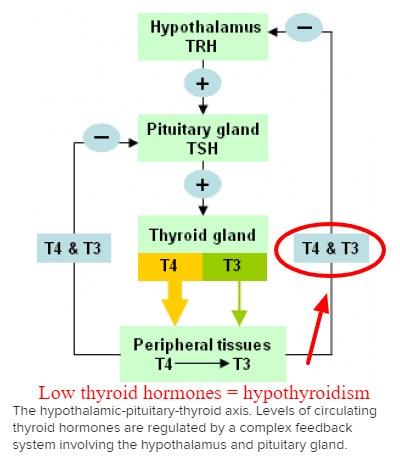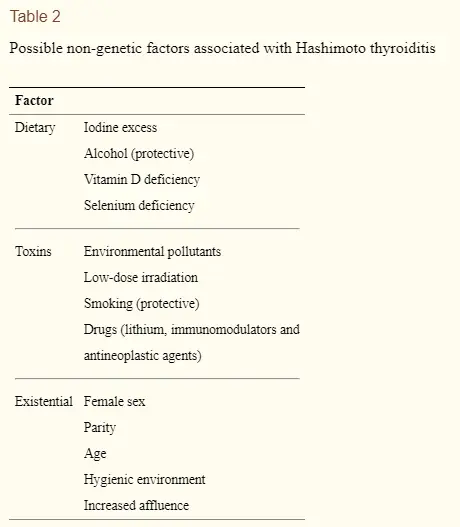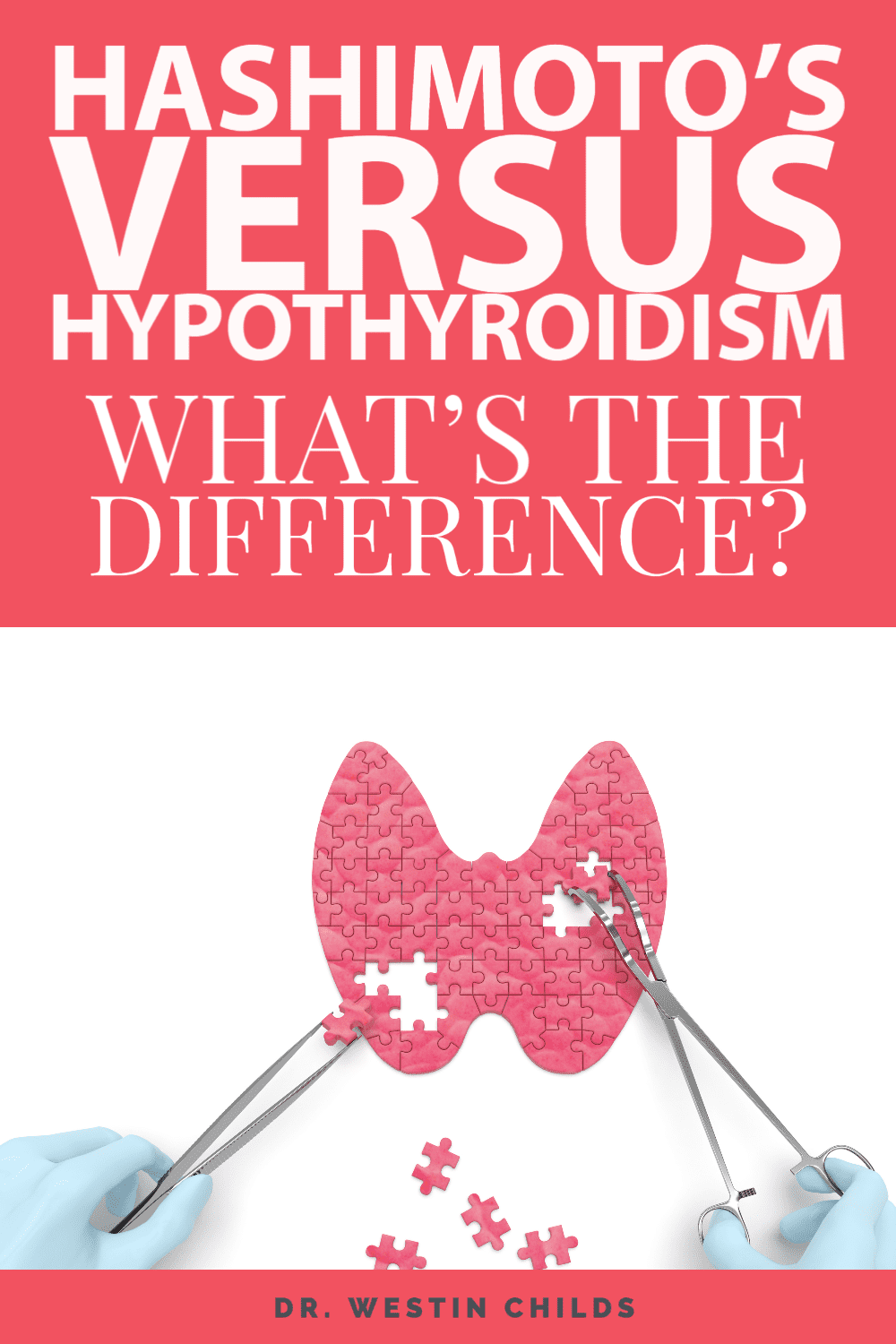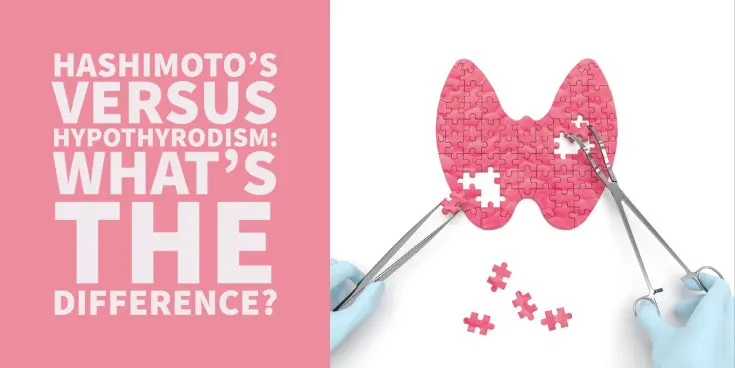Are you suffering from Hashimoto’s or hypothyroidism?
Do you completely understand what these conditions mean and how they impact your body?
Did you know that these conditions are different and may require different treatments?
In this article, I’m going to explain the difference between these two conditions and discuss why it’s important to know what is happening in your body.
Highlights from the article:
- Hypothyroidism and Hashimoto’s thyroiditis are similar but not the exact same.
- Hypothyroidism is a broad term used to describe a state of low thyroid function in the body. Some patients with Hashimoto’s may also have hypothyroidism, but having Hashimoto’s does not guarantee that you will be hypothyroid.
- Hashimoto’s thyroiditis is an autoimmune disease and may be associated with episodes of hyperthyroidism, normal thyroid function, and hypothyroidism.
- Both conditions are treated differently so it’s important to know which condition you have!
Hypothyroidism and Hashimoto’s are Similar but Different
Let’s first start by defining hypothyroidism because it is easier to understand compared to Hashimoto’s.
Hypothyroidism simply refers to a state of low thyroid function in the body.
This state is almost always the result of decreased thyroid hormone production directly from the thyroid gland, but it can also be from resistance to thyroid hormone at the cellular level (this one is rare though, so let’s focus more on the thyroid gland production issue).
It’s pretty simple actually:
Whenever your thyroid gland, which sits in your neck, can’t produce enough thyroid hormone for your body and cells you will experience the symptoms of hypothyroidism.
These symptoms include things like fatigue, weight gain, hair loss, cold intolerance, constipation, other hormone issues, and so on.
But saying you have hypothyroidism is not very specific because there are a great many things that can cause hypothyroidism including Hashimoto’s.

But while Hashimoto’s can cause hypothyroidism, there are also many many other things that can lead to this state of disordered thyroid hormone production (some of the causes are listed below).
Knowing you have hypothyroidism is important, though, because that means that something is necessary to fix that problem.
Most of the therapies for hypothyroidism are directed at trying to improve how much thyroid hormone is floating around in your body.
You can do this by using natural therapies (listed here) or you can do it by taking thyroid hormone medication.
The big difference between hypothyroidism (the state of low thyroid function in the body) and Hashimoto’s, is that both Hashimoto’s and hypothyroidism can co-exist together but they don’t necessarily have to.
It’s possible for you to have both hypothyroidism and Hashimoto’s, but it’s also possible for you to have Hashimoto’s and not be in a state of hypothyroidism.
Remember:
Hypothyroidism and hyperthyroidism only refer to the state of thyroid function and activity in your body, they don’t tell you anything about what caused the problem.
And this is a big deal because understanding the cause of your condition helps to guide your treatment.
DOWNLOAD FREE RESOURCES
Foods to Avoid if you Have Thyroid Problems:
I’ve found that these 10 foods cause the most problems for thyroid patients. Learn which foods you should avoid if you have thyroid disease of any type.
The Complete List of Thyroid Lab tests:
The list includes optimal ranges, normal ranges, and the complete list of tests you need to diagnose and manage thyroid disease correctly!
Hashimoto’s Explained
While hypothyroidism and Hashimoto’s are not the same thing it’s important to realize that the vast majority of cases of hypothyroidism are caused by Hashimoto’s.
This is true simply because the most common cause of hypothyroidism is Hashimoto’s thyroiditis.
It is estimated that roughly 60-80% of all cases of hypothyroidism are due to this autoimmune condition (1).
So, if you are reading this, there is a good chance that you may have hypothyroidism caused by Hashimoto’s without even realizing it.
How can this be?
I discuss why in the section below.
There are some important distinctions between hypothyroidism and Hashimoto’s that we should touch on now.
The first is that Hashimoto’s is an autoimmune condition caused by the attack of your own immune system on your thyroid gland (2).
This autoimmune attack, if not suppressed or treated, may ultimately lead to the permanent destruction of your thyroid gland.
The second is that Hashimoto’s is associated with more than just hypothyroidism.
Patients with Hashimoto’s often experience episodes of hypothyroidism, hyperthyroidism, and even normal thyroid function.
This roller coaster of symptoms is often VERY frustrating for patients because you can go from feeling “normal” to gain 5-10 pounds in the course of a month.
The reason for this has to do with how autoimmune conditions influence your thyroid.
Hashimoto’s damages your thyroid from inflammation, but this inflammation doesn’t always ensure that your thyroid gland will be unable to produce less thyroid hormone.
Sometimes this inflammation results in the release of MORE thyroid hormone which causes hyperthyroidism.
And sometimes, due to reasons we don’t fully understand, your thyroid can become completely normal and not cause you any issues.
When treating Hashimoto’s (something I touch on below), the entire goal is to try and harness that state and reduce immune attack and damage to your thyroid gland.
Third, the causes of Hashimoto’s are different from those things which cause hypothyroidism.
Hypothyroidism can be caused by (3):
- Nutrient and iodine deficiencies
- Removal of the thyroid gland or exposure to radioactive iodine
- Severe dieting or calorie restriction
- Obesity
- Certain medications
- Damage to your pituitary or hypothalamus (certain parts of your brain)
- Damage to the thyroid gland from trauma
- Inflammation in the thyroid gland from infection (virus or bacterial)
- Being born without a thyroid gland
Hashimoto’s, on the other hand, is often caused by the following:
- Exposure to certain viruses such as Epstein Barr virus (4)
- Dysregulation of the intestinal lining of your gut (5)
- Mineral and nutrient status (6) (taking too much iodine, not taking enough iodine, selenium deficiency)
- Exposure to stress (7)
- Exposure to certain chemicals (8)
- Exposure to heavy metals (9)

And lastly, Hashimoto’s should be differentiated from hypothyroidism because it is a potentially reversible cause of hypothyroidism.
Not all cases of Hashimoto’s will necessarily progress to hypothyroidism (even without treatment).
There is a small chance that your body can recover (10), that your immune system can stabilize, and that you will no longer suffer from this debilitating condition.
This can even happen in the absence of treatments or therapies!
Now that we are getting into treatment territory, let’s go into a little more detail.
Treatment is Different for Each Condition
Perhaps the most important distinction between these two conditions is the fact that each one is treated differently!
This may come as a surprise to you, however, because most physicians are not concerned about distinguishing between hypothyroidism and Hashimoto’s.
I’ll explain why:
Doctors, including endocrinologists, believe that it isn’t necessary to treat Hashimoto’s for two main reasons.
The first is the fact that autoimmune diseases can’t really be treated with conventional medicines (but that doesn’t mean they can’t be treated with natural therapies such as diet, stress reduction, supplements, exercise, and so on).
The second is because they feel that most cases of Hashimoto’s will ultimately end up causing hypothyroidism and that you will eventually need to be on thyroid medication anyway.
So, the logic goes, let’s just wait until your thyroid gland is destroyed enough that it impacts thyroid function negatively and put you on thyroid medication and then call it a day.
This obviously doesn’t sit well with most people who would like to at least try to prevent this damage from occurring.
And, believe it or not, there are a great many people who strongly believe (I happen to be one of them) that certain therapies may be able to prevent the so-called inevitable decline of thyroid function in your body.
The reason that most conventional doctors including family practice doctors and endocrinologists don’t believe in this approach (11) is that there aren’t clinical studies to fall back on to prove that these therapies are effective.

But just because there aren’t studies proving that they work doesn’t mean that they don’t!
You have to remember that it costs a lot of money to conduct a clinical study and most of that money comes from pharmaceutical companies who have “skin in the game” in the form of some sort of medication (12).
They are willing to provide money for a study to see if their drug positively impacts Hashimoto’s, but they have little incentive to fund a study for supplements or other natural therapies which may compete with their own medication.
That means there isn’t much incentive for someone to conduct a study to see whether or not diet impacts Hashimoto’s.
After all, who would pay for it?
But, as I said earlier, it doesn’t mean that these therapies are not effective.
In addition, it’s not as if changing your diet or adding exercise to your daily routine is going to cause significant harm to your body.
You should, however, avoid natural therapies which have outrageous claims or ones that are incredibly expensive and not likely to work.
I should also point out that not all natural therapies work, and that there is a theoretical possibility that the benefit from these therapies is simply due to the placebo effect.
While I don’t believe that this is true, there is a possibility that it could be.
For more information on therapies (natural and medical), I would recommend that you check out this article.
How do you Tell The Difference?
Most of you are probably aware of which condition you have, either hypothyroidism or Hashimoto’s.
Some of you may actually have both.
But what about the others who aren’t quite sure?
How do they figure out what is happening in their body?
If you fit into this category, then your next step should be to try and figure out exactly what is going on in your body.
You can do this through basic tests which help you understand how your thyroid is operating and whether or not you are showing signs of having autoimmune thyroiditis.
This can be easily accomplished with the following tests:
- Thyroid function lab tests – Thyroid function lab tests can tell you how well your thyroid is functioning but they don’t tell you why it may be underperforming or overperforming. These tests are always necessary to get but don’t always give you a lot of information about the cause of your issue.
- Thyroid antibody testing – Thyroid antibody testing can help diagnose and differentiate between the various causes of hypothyroidism and Hashimoto’s. If your thyroid antibodies are positive then there is a very high probability that you are suffering from autoimmune thyroiditis. It’s important to note, however, that it’s possible for you to have elevated antibodies and NOT have Hashimoto’s, so this test is not 100% perfect.
- Thyroid Ultrasound – Another easy way to diagnose autoimmune disease is through the use of thyroid ultrasound. This test can help give you information about the size of your thyroid gland and whether or not inflammation is present. This test is non-invasive and is relatively easy to perform.
- Biopsy (rarely necessary) – Lastly, you can also get a thyroid biopsy to definitely diagnose Hashimoto’s thyroiditis or other thyroid issues. While this test is by far the most accurate way to diagnose thyroid problems (13), it’s also the most invasive of all the tests and carries with it significant risks. It’s best to use this test only as a last resort or in cases where a biopsy is absolutely necessary (such as testing for thyroid cancer).
By obtaining these tests you should be able to figure out what is causing your thyroid problems which can help you determine how to treat your issue.
My recommendation is to start with basic blood tests including thyroid function lab tests and thyroid antibody tests.
These tests only require a blood draw and can give you plenty of information.
In more difficult-to-diagnose cases, you may be required to undergo ultrasound testing or even a biopsy but this is not common.
Do you Need Hypothyroid Medication?
Lastly, I should say a word about thyroid medication.
Thyroid medication is the treatment for hypothyroidism and it may also be required if you have Hashimoto’s thyroiditis.
Thyroid medication is taken by mouth each and every day and it’s supposed to help normalize thyroid function in your body.
Because your own thyroid gland can’t produce enough thyroid hormone on its own, you can take thyroid medication to help supplement the difference.
But it’s important that you don’t confuse thyroid medication with other prescription medications.
While thyroid medication does require a prescription to get, it’s unlike other prescription medications because it is an exact replica of the same thyroid hormone that your body produces naturally.
Other medications, such as blood pressure medication and cholesterol-lowering medication, are artificially and synthetically created and are not normally found in your body.
These medications alter your physiology to create some desired outcome. As this occurs, it’s not unusual for people to experience negative and unwanted side effects.
Some people taking thyroid medication do experience side effects, but the vast majority should actually feel BETTER when taking thyroid medication.
If you are taking thyroid medication and not feeling better then that may be an indication that your dose of thyroid medication is off.
Because taking too little or taking too much can all cause issues, but not because of the medication itself, instead, it is related to your dose.
But, even having said all of this, it may not be required for all people with Hashimoto’s to take thyroid medication.
There is a chance that you can “cure” your disease and help your thyroid function normally again on its own if you have Hashimoto’s.
This can also be true of hypothyroidism, but it depends on the CAUSE of the disease.
If your cause is potentially reversible, then you may not need to be on medication long-term.
But, if your cause is not reversible, then you may need to be on medication indefinitely.
This applies to people who have late-stage Hashimoto’s where their thyroid gland has atrophied and been destroyed as a result of chronic inflammation.
People in this category will require thyroid medication indefinitely.
Early-stage Hashimoto’s, on the other hand, may be able to be treated naturally and long-term use of thyroid medication may be avoided.
Wrapping it Up
The bottom line?
There is an important distinction between hypothyroidism and Hashimoto’s and this distinction has a great impact on your health and your treatment options.
If you are suffering from hypothyroidism then you absolutely must be tested for Hashimoto’s.
You might be surprised to know that many doctors don’t think to do this so it may be prudent for you to ask (even if you’ve been taking thyroid medication for years!).
If you have hypothyroidism you should always be searching for the cause of your thyroid problem because once you know the cause then you can attempt to reverse or treat the main issue.
Note, however, that it may not always be possible for you to do this (some thyroid conditions are not reversible).
Now I want to hear from you:
Do you have hypothyroidism?
Do you also have Hashimoto’s or do you suspect that you do?
Have you been properly tested?
Are you struggling to feel better? Why or why not?
Leave your questions or comments below!









